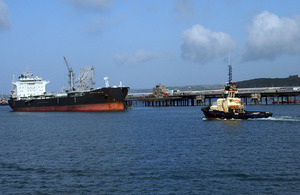Future of low-sulphur shipping fuel under the spotlight
Low-sulphur fuel to be used to reduce pollution from shipping.

Ships at sea
Governments and industry representatives met in London today (10 September 2013) to discuss the future availability of low-sulphur fuel which will drive down pollution from shipping.
In 2008 the UN’s International Maritime Organization (IMO) agreed measures to limit polluting sulphur emissions from shipping.
The sulphur limit for fuel used in seas other than specially designated emission control areas, which have stricter limits, is currently 3.50%, and will be reduced to 0.50% from 1 January 2020 – subject to a review of the availability of 0.50% sulphur fuel.
As part of London International Shipping Week, Secretary-General of the IMO, Koji Sekimizu, and Shipping Minister Stephen Hammond hosted an event today (10 September 2013) for invited representatives of maritime nations and international industry associations at which the hosts stressed the importance of dispelling the uncertainty which surrounds the start date for the review and highlighted a way forward.
Mr Sekimizu said:
IMO has set a goal for sulphur regulations in 2008 and the current global target is set for 2020. It is important for IMO to act now to have a clear picture on the availability of the required quantity of the low-sulphur fuel as soon as possible.
Annex VI stipulates that the review must be completed by 2018, but there is nothing to say that it cannot be completed earlier. Indeed, there is a strong argument that early completion of the review of the availability of low sulphur fuel will give more time for all concerned, including the refinery industry, to take the necessary action and react in time to meet the requirements if such a need is identified.
Mr Hammond said that the review should start at the earliest realistic date consistent with adequate information being practically available, which the UK considers to be January 2015:
Mr Hammond said:
Reaching agreement on the new sulphur limits in 2008 was a notable achievement, and as a consequence enhanced the reputation of the IMO. Now it is vital to agree the timing of this review.
Uncertainty around dates is likely to delay crucial investment decisions and industry needs a clear steer. All sectors of the shipping and petro-chemical industry would be better able to plan, control costs and manage the transition once we have a date for the review.
Mr Hammond said that the UK plans to submit a paper on the subject for the consideration of the next session of the IMO’s Marine Environment Protection Committee next spring.
Pollutant emissions from ships are regulated by Annex VI to the International Convention for the Prevention of Pollution from Ships (commonly known as the MARPOL convention). In October 2008, the IMO formally adopted the revised Annex VI, which imposes phased stringent requirements for sulphur emissions from ships:
- in emission control areas (ECAs), with the most stringent requirements coming into effect on 1 January 2015
- in waters which are not ECAs, with the most stringent requirements coming into effect in 2020 unless a review of the availability of 0.50% sulphur fuel (which must be completed by 2018) indicates that sufficient fuel will not be available, in which case the requirement may be deferred to 2025
The IMO has designated 3 ECAs which are currently in effect: the Baltic Sea ECA (sulphur oxides only); the North Sea ECA (sulphur oxides only), which includes the English Channel; and the North American ECA (sulphur oxides, nitrogen oxides and particulate matter). The IMO has also designated the United States Caribbean Sea ECA (sulphur oxides, nitrogen oxides and particulate matter), which will take effect on 1 January 2014.
MARPOL requires the review of the availability of 0.50% sulphur fuel to have been completed by 2018. The start date of the review has been considered by an IMO correspondence group. The correspondence group reported to the 62nd session of the IMO’s Marine Environment Protection Committee in 2011 that the start date should be between 2015 and 2017 for the review. The correspondence group’s report did not favour a start date before 2015. The committee has yet to take a decision on the appropriate date for the start of the review.